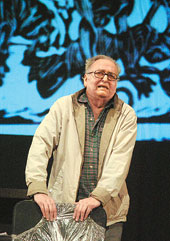 |
| Soumitra Chatterjee rehearses for Tritio Onko Otoyeb. (Aranya Sen) |
The curtain rises to find three actors terrified of the darkness around them, sensing the presence of a hidden assassin who not only lurks in their midst but also waits, knife in hand, in the mind, making escape impossible. The three (played by Soumitra Chatterjee, Poulami Bose and Dwijen Bandyopadhyay) represent a single character’s experiences — past, present and future — and his encounter with the ultimate fear — death.
“There is just one character here and that is Soumitra Chatterjee. Tritio Onko Otoyeb probably is the first openly autobiographical play in Bengali. It’s not, of course, the whole thing —there is hardly anything about Satyajit Ray or Sisir Bhaduri because I have written about them elsewhere. My film career finds minimal space in this play because the focus is more philosophic but I have tried to find entertaining anecdotes and humorous elements to narrate and at times enact through the three actors,” Soumitra Chatterjee told Metro during rehearsals at Madhusudan Mancha.
“These are my childhood experiences, my youth… right up to how I am now… the travails of old age and illness, the fear of death,” the 74-year-old actor added. Tritio Onko Otoyeb premieres at the same venue on January 12 at 6.30pm, produced by Prachya.
Starting with his “illness that comes like a nightmare” Soumitra looks back at other instances of extreme fear and death. In Krishnagar, during the man-made famine of 1943, brother Sambit and he, aged eight and 10, had tasted the anxiety of being unsure of having the basic amenities. They had seen the hungry tide crying out for phyan (rice stock) and the skeletal spectre of death. Then in Howrah, during the communal riots of 1946, Soumitra had seen how a “living being can suddenly die and be converted into an ignominious object that can be left to float away uncared for down the Ganga”. When a youth runs with a knife embedded in his back, Soumitra discovers and relates to this universal desire to run away from death, and survive.
The play, written in May 2009, gets its title from a line in Jibanananda Das’s poem Uttarprobesh “Tritio onko otoyeb ekhon agun ebong alo”. So the soul-searching leads to a self realisation and a positive attitude to death. “Towards the end there is the realisation that death is not an assassin but a friend who comes to relieve one from pain. Death makes the little joys of living more meaningful,” said Soumitra.
The narrative is supplemented by an original score that borrows from Western classical music “because that is more effective in bringing out the dramatic elements” and projections of paintings by Zainul Abedin, Somnath Hore, Shahabuddin Ahmed, Rabin Mondal and a death mask by Sudip Banerjee.
Present-day politics is conspicuous by its absence in Tritio Onko…. “I am myself not sure if I understand what is happening. I can understand that there have been mistakes in the 32-year Left Front regime, but I don’t know what to make of the alternatives I am offered. So I have concentrated more on myself and my feelings,” smiled Soumitra.










